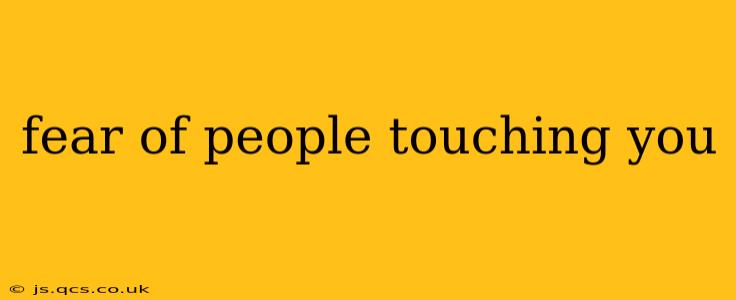The fear of being touched, also known as haphephobia or aphephobia, is a specific phobia that can significantly impact a person's life. It's more than just a dislike of physical contact; it's an intense, irrational fear that triggers anxiety and avoidance behaviors. This comprehensive guide delves into the causes, symptoms, and treatment options for haphephobia, aiming to provide a deeper understanding of this often misunderstood condition.
What is Haphephobia?
Haphephobia is a persistent and excessive fear of being touched. This fear isn't limited to unwanted or inappropriate touching; it can extend to even casual physical contact from loved ones, friends, or even necessary medical procedures. The intensity of the fear varies greatly from person to person. Some individuals might experience mild discomfort, while others may experience debilitating panic attacks at the mere thought of being touched.
The fear is often irrational, meaning the person recognizes that their fear is excessive, but they're unable to control it. This irrationality is a key characteristic differentiating haphephobia from a healthy aversion to unwanted touch.
What Causes Haphephobia?
The exact cause of haphephobia remains unclear, but several factors are believed to contribute:
-
Past Traumatic Experiences: Negative experiences involving unwanted or forceful physical contact, such as abuse, assault, or accidents, are often cited as major triggers. The trauma can lead to a deep-seated association between touch and fear.
-
Genetic Predisposition: Some individuals might be genetically predisposed to developing phobias, including haphephobia. Family history of anxiety disorders can increase the likelihood of developing this condition.
-
Learned Behavior: A child observing a parent or caregiver exhibiting a strong aversion to touch might learn to replicate this behavior. This learned behavior can solidify into a full-blown phobia over time.
What are the Symptoms of Haphephobia?
Symptoms of haphephobia can range from mild discomfort to severe panic attacks. These symptoms might include:
-
Physical Symptoms: Rapid heartbeat, sweating, shortness of breath, trembling, nausea, dizziness, and muscle tension.
-
Emotional Symptoms: Intense fear, anxiety, panic, feeling overwhelmed, and a sense of impending doom.
-
Behavioral Symptoms: Avoidance of physical contact, seeking distance from others, and exhibiting strong reactions (e.g., flinching, recoiling) when touched unexpectedly.
How Does Haphephobia Impact Daily Life?
The impact of haphephobia can vary depending on its severity. However, even mild cases can affect social interactions, relationships, and work life. Individuals might struggle with:
- Social Isolation: Avoiding social situations to minimize the risk of physical contact.
- Relationship Difficulties: Strain on relationships due to the inability to engage in physical affection.
- Occupational Challenges: Difficulties in jobs requiring physical interaction or close proximity to others.
- Healthcare Challenges: Anxiety and resistance to necessary medical procedures requiring physical contact.
How is Haphephobia Treated?
Several therapeutic approaches can help manage haphephobia:
-
Cognitive Behavioral Therapy (CBT): CBT helps individuals identify and challenge negative thoughts and beliefs associated with being touched. It also involves gradual exposure to physical contact in a safe and controlled environment.
-
Exposure Therapy: This involves gradually exposing the individual to their feared stimulus (being touched) in a safe and controlled manner, starting with less anxiety-provoking situations and progressively increasing exposure.
-
Medication: In some cases, medication might be prescribed to manage anxiety symptoms. This is often used in conjunction with therapy.
-
Relaxation Techniques: Techniques such as deep breathing, meditation, and progressive muscle relaxation can help manage anxiety symptoms.
Is Haphephobia Rare?
While not as widely discussed as other phobias, haphephobia is not uncommon. The exact prevalence is difficult to determine due to underreporting and a lack of widespread research. However, many people silently struggle with this condition, fearing judgment or misunderstanding.
Can Haphephobia Be Overcome?
Yes, with professional help and consistent effort, haphephobia can be managed and even overcome. Therapy, particularly CBT and exposure therapy, has proven highly effective in helping individuals regain control over their fear and improve their quality of life.
This information is intended for educational purposes only and does not constitute medical advice. If you are struggling with haphephobia, seeking professional help from a qualified mental health professional is crucial. They can provide a proper diagnosis and develop a personalized treatment plan tailored to your specific needs.
